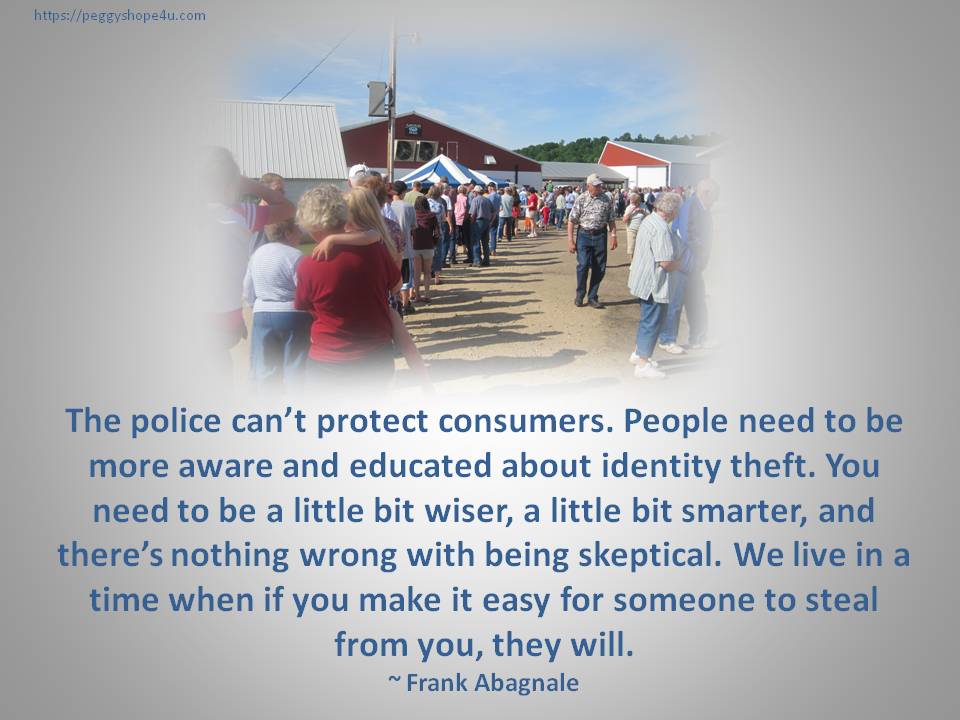Identity Theft Nailed This Author

In the summer of 2018, I received a phone call from my credit card company. That call abruptly swept me into the ugly world of identity theft and I was terrified by the implications.
Those of you who know me realize that I spent the majority of my career in the field of credit.
During the last twenty-four years before retirement, I worked for the National Association of Credit Management in commercial credit. I sold Experian Commercial Credit Reports to businesses and helped train some of the nation’s largest companies and banks in credit methods and fraud. I know how to protect my credit assets.
There was only one business in Menomonie where my husband and I had both used our credit cards. It’s possible we missed one of those boxes the thieves insert into the credit card slot at the pump. Or, the thieves might have lifted our card numbers during the breach at Equifax.
Who knows what triggered two different credit card companies to notify us of suspicious use of our credit cards over a three-day period? Retirement relaxed my defenses, and I became as vulnerable as everyone else to the potential losses many suffer from identity theft.
Within hours of being notified by the credit card companies, we canceled both credit cards, contacted the local police, and ran a free credit report from Experian. (More on how to do that below.)
We also placed fraud alerts on our credit reports at Experia, Equifax, and TransUnion. Then, we notified the Federal Trade Commission (FTC) and contacted our bank. Before we were done, we changed passwords on many of our accounts.
There are so many things you need to do immediately upon learning you’re a victim of identity theft.
Identity Theft: Protect Yourself
My husband and I were lucky. Our credit card companies spotted the unusual activity on our credit cards and denied access. One of the reasons they noticed it so quickly is because of the steps we take when we travel away from home. We always call the number on the back of our credit card when we vacation. Then, we inform the credit card company where we are going and the route we will take.
Mike and I both have several credit cards. Only one goes with us on trips. The rest are put into the lock box at the bank until we return.
We have set up a separate bank account for vacations. Then, we transfer only the estimated amount of cash needed for the trip from our regular accounts into the travel account. That way, if someone steals my purse or his billfold, the amount they can take is limited to the cost of the trip.

Experian Offers 7 Steps to Protect Yourself After Identity Theft:
Fraudsters are getting more sophisticated in their identity theft attacks, and are using more complex and difficult-to-detect monetization schemes, making identity theft that much harder to prevent and more difficult to detect.
The good news is there are plenty of ways to minimize the damage of identity theft if you act quickly and decisively.
1. Place a Fraud Alert on Your Credit Report
Step number one in an identity theft scenario is to add a 90-day fraud alert to your credit report. If you contact Experian, they’ll share the fraud alert with Equifax and TransUnion.
A Fraud Alert will flag any lenders or creditors to contact you before opening any new accounts. You may also want to consider a credit freeze, but there are items to consider before freezing your credit report.
2. Review Your Credit Report
You’ll also want to review your credit report to see if anything unfamiliar appears on it. You can get a free credit report from each of the credit bureaus every 12 months and also get your free Experian credit report here on Experian.com.
If you’re a member of Experian IdentityWorks or Experian CreditWorks, you can easily view your Experian credit report (along with all accounts and inquiries) and then easily dispute anything online or speak with one of our representatives.
3. Report Identity Theft to the FTC
Next, go to the Federal Trade Commission’s ID Theft Reporting website IdentityTheft.org to file a report. The FTC will walk you through your report, point you to the right recovery resources, and ultimately help you build an individual identity theft response plan to get you on the road to recovery.
This report will document the identity theft and allow you to prove you’ve been the victim of identity theft and extend the fraud alert for seven years. This will also help you if you need to file a police report or provide proof of identity theft to anyone else.
After you file an identity theft report with the FTC, you’ll be issued an Identity Theft Victim’s Complaint and Affidavit.
4. Assess the Damage and Report the Fraud
You’ll also want to list any personal data (for example, credit card numbers, email addresses or your Social Security number) after an identity theft scenario. Keep the list as a hard copy or digital file for accurate recordkeeping for law enforcement officials and creditors working on your behalf in an identity theft investigation.
Contact Experian at the phone number on your credit report, or if you’re a paid member of Experian CreditWorks or Experian IdentityWorks, you can also speak with a fraud resolution specialist who will walk you through all the steps you need to take.
You’ll get a dedicated representative who you can call back directly and who will help you with disputing the information and sending letters to the other credit bureaus. Anyone can dispute information on their credit report and notify Experian and the other bureaus of fraud. You’ll want to make sure you extend the fraud report on your credit file.
5. Contact Your Creditors and Financial Institutions
You’ll want to let any creditors know if there were fraudulent accounts created in your name. Also, it’s a good idea to make your existing lenders and banks know about the fraud so that they can keep an eye out for any red flags for additional theft.
Review all of your bank account documentation in the days, weeks and even months after a cybersecurity breach. Take a close look at all of your bank statements and use a credit monitoring service like Experian CreditWorks to make sure no one tries to access your credit.
6. Report the Fraud to the Appropriate State and Federal Agencies
Your specific reporting is another instance where the type of theft dictates your actions.
7. Change Your Passwords
If you think any accounts were breached, you should immediately change your passwords. Mixing up your digital passwords on your smartphone, computer, and financial accounts can also prevent future issues. Use complex and varied passwords for different accounts_that will minimize the chances that anyone will hack into more than one of your accounts going forward.
Read the entire article on Experian’s Website and retain it for quick future reference.
For more information on responding to an identity theft attack, visit Experian’s Victim Assistance site.

The Biggest Threat After Identity Theft Is In Not Acting Quickly Enough
We may never know precisely how our credit card numbers ended up in the hands of the thieves. It could have been at the gas station.
There’s a strong possibility the breach at Equifax placed our credit card information in the hands of the thieves. If that was the case, other sensitive information is at risk in the future. Its the reason I need to remain vigilent and so do you.
YOU, can’t afford to wait until it happens to you. The best defense against identity theft is in a perfectly well-planned offense. Know what to do before it happens to you.
Wow! Peggy that was a close call. I also have had a few near misses with fraudsters. They are so slick and cunning and hard to detect when your guard is down. I heard just recently of a man who committed suicide as he had been scammed out of his life savings. So tragic but these thieves are ruthless and no thought or care for the victims.
We were so grateful to the credit card company that noticed the anomaly in the use of our credit card information and notified us. It’s truly frightening when it happens to you and somehow, life changes as a result. You no longer feel safe and are constantly guarded. I think that’s the part I hate the most. My personality longs to trust people and that’s no longer possible. So many lives have been destroyed by these thieves. Unfortunately, we live in a world that is no longer as safe as when we were growing up.